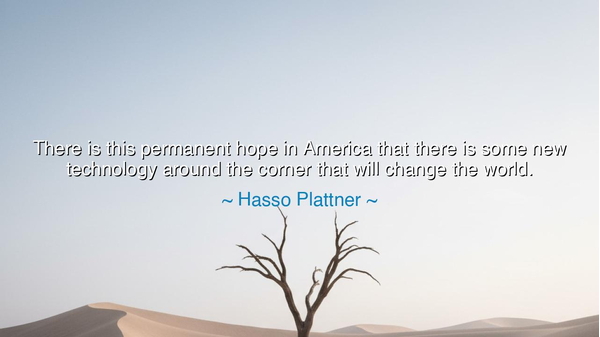
There is this permanent hope in America that there is some new
There is this permanent hope in America that there is some new technology around the corner that will change the world.






Hearken to the voice of Hasso Plattner, who beheld the restless spirit of a nation and declared: “There is this permanent hope in America that there is some new technology around the corner that will change the world.” This is not a mere observation, but a song of the heart of a people, a people who look ever forward, whose eyes are fixed on horizons yet unseen. It is the hymn of a land that dreams ceaselessly, that believes salvation, progress, and destiny may be found in the forge of technology.
This permanent hope is both blessing and burden. It is blessing because it ignites the imagination and drives invention beyond measure. It is burden because it tempts one to look always to the next miracle, forgetting the strength that must come from within. Yet in this duality lies the truth of America’s character: to hope without ceasing, to believe that tomorrow can be greater, and that around the next corner lies the spark that will light a new age.
Consider the tale of the Wright brothers, who in a modest bicycle shop dared to dream that men could fly. In their time, such visions were madness; yet their fragile machine lifted from the earth at Kitty Hawk and changed forever how humanity moved upon the face of the world. That moment was not mere engineering, but the embodiment of this American hope—that a small group, armed with vision and courage, could bring forth wonders undreamed of by kings.
So too with the birth of the Silicon Valley, where orchards gave way to circuits and a generation of dreamers fashioned devices that carried voices across oceans and placed knowledge at the fingertips of every soul. From the garage of Hewlett and Packard, from the vision of Jobs and Wozniak, from the code of countless unknown laborers, arose a digital empire that reshaped commerce, art, and even thought itself. Each new dawn brought the promise of another revelation, another tool, another technology to transform the fabric of life.
Yet wisdom must temper this tale. For hope is a flame, and flame can both guide and consume. The permanent hope that Plattner names can lead men to greatness, but it can also blind them to the present. Too often the cry is, “The next invention will save us,” while injustice and suffering remain unsolved in the moment. The people must remember that no technology alone can heal the heart, bring justice, or cultivate peace. These must be labors of spirit, even as the machines advance.
The lesson, O seeker, is clear: let your hope be strong, but let it be grounded. Look forward with courage, as the Wrights once did, but also act now with compassion. Use the tools of today while preparing for the wonders of tomorrow. Do not wait for salvation from the next invention; instead, become the one who shapes invention into a servant of goodness. For hope without action is but a dream, but hope joined with labor becomes destiny.
Practical action lies in this: when you see a new tool, do not ask only, “How will this change the world?” Ask, “How will I use it to better the world?” Let your hope be coupled with responsibility. Nurture innovation, but also nurture wisdom, lest technology become a sword without a hand to guide it. Hold fast to hope, but do not be enslaved by it. Remember that the true change lies not around the corner, but within the heart of the one who dares to hope and act.
So carry this teaching with you: hope is eternal, but its power is fulfilled only through deeds. America’s gift is her unyielding faith in the future, her refusal to accept that the story is finished. Let that faith inspire you, but let your hands write the new chapter. For it is not the invention alone that changes the world, but the spirit that wields it with vision, courage, and care.






AAdministratorAdministrator
Welcome, honored guests. Please leave a comment, we will respond soon